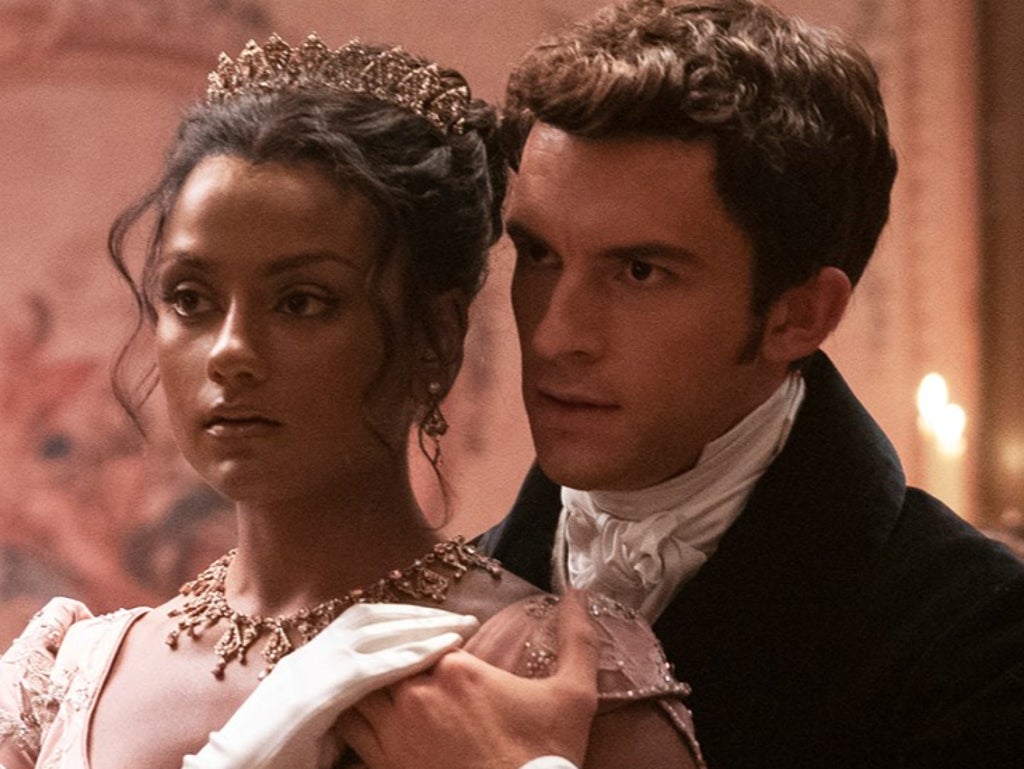
To call Bridgerton “Jane Austen with sex” would do a disservice to both parties. But when it first aired in 2020, Netflix’s adaptation of Julia Quinn’s novels inevitably drew that trite observation. It is, after all, a show that embraces the conventions of social class, stately homes and slow-burn wooing that Austen has popularised for two centuries. If Austen is buttoned-up, unrequited and implicit, then Bridgerton rendered the same dynamics in overt, even garish colours – not to mention a smattering of breasts and buttocks. And where Austen is favoured by folk who are horny for etiquette, Bridgerton catered to an even larger demographic: people who are just plain horny.
As it returns, the show hopes to pick up where it left off, tonally if not narratively. Bridgerton is, fundamentally, about courtship, not marriage. Hence Daphne (Phoebe Dynevor) and Simon (Regé-Jean Page), the Duchess and Duke of Hastings, are shuffled out of the pack, and replaced by a bevy of childless singletons. Foremost amongst the new arrivals are the Sharma sisters, Kate and Edwina (Sex Education’s Simone Ashley and Alex Rider’s Charithra Chandran respectively). The Sharmas represent an inversion of Sense and Sensibility’s core dichotomy: Edwina, the Marianne figure, wants to marry “a prince or duke’’, while her older sister Kate – the Eleanor – urges her to marry for love. Yet Kate is the responsible “old maid”, terrifyingly considered, at 26, of too advanced years to find a husband of her own.
Of the extant cast, the plot reins are passed predominantly to Jonathan Bailey’s chaotic Anthony Bridgerton and his truculent younger sister Eloise, played by Line of Duty’s Claudia Jessie. Anthony, having been ditched by his opera singer squeeze, is on the hunt for a wife. He pursues Edwina, who has won Queen Charlotte’s title of “diamond of the season”, whilst flirting incessantly with her sister, and guardian, Kate. Eloise, meanwhile, has “come out” but is desperately avoiding all possible suitors. Just as importantly, Penelope Featherington (Derry Girls’ Nicola Coughlan) has now been unmasked (to viewers at least) as Lady Whistledown, which removes one of the central mysteries of Bridgerton, even if it allows us to witness the methodology of someone labelled an “insipid wallflower” by her peers.
The reset of this new series of Bridgerton is, it must be said, a touch harsh. The entire central dilemma (and the very attractive couple seeking to resolve it) of the first season has been excised, giving this opening episode – “Capital-R-Rake” – the feeling of a spin-off. They might as well have renamed the entire show The Other Bridgertons. And on a spectrum running from Frasier to Joey, The Other Bridgertons would be somewhere in the middle: a more trivial work than its parent, but not without its charms.
The reality is that Daphne, for all her doe-eyes and baby hairs, was a less charismatic Bridgerton than either Anthony or Eloise. Indeed, in her proto-feminist, anti-establishment leanings, Eloise always had a stronger sense of Main Character Energy than her elder sister (she has begun reading Mary Wollstonecraft, labelled “rather haughty” by Penelope, in the off-season absence of Lady Whistledown’s gossip rag). All the same, the new season lacks the romantic vigour of Simon’s tortured pursuit of Daphne – the dynamic between Kate and Anthony (all rather transparently Lizzie Bennett and Mr Darcy) feels much more forced. And Jonathan Bailey, even with a razor applied to his period facial hair, felt more convincing and comfortable as the wayward son than the romantic lead.
But look, sometimes television criticism, like television itself, is best served by erring towards the facile. And Bridgerton harbours no illusions about what it is: a profoundly unsubtle opportunity to see beautiful, bonneted people tup by candlelight. From the overdressed sets – which have the same aesthetic as a WeWork on Valentine’s Day – to the overdressed cast, it is a show that indulges our basest qualities, but does so delightfully. Bridgerton might be close to losing the plot, but be honest with yourself: you weren’t watching for that anyway.







